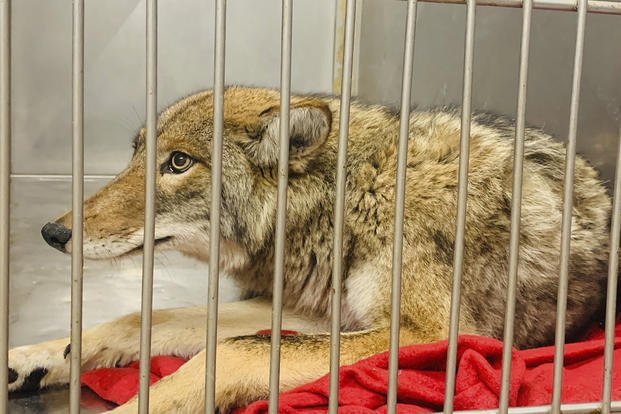At least six Alaska National Guardsmen were attacked by coyotes during a rotation to the Joint Readiness Training Center, or JRTC, in Louisiana in July.
Soldiers assigned to the 297th Infantry Regiment were injured when they encountered up to four coyotes while training at Fort Johnson, Louisiana, according to a base spokesperson. The soldiers likely encountered a den and were attacked by the wild dogs, suffering bite marks to their arms and head.
The soldiers were all treated for injuries and released from medical care. Fort Johnson wildlife officials shot one of the coyotes and captured another for rabies testing. The soldiers were armed with rifles but were training with blanks, which is common in the training environment.
It's unclear if the soldiers provoked the coyotes. Service members are routinely briefed before trained events to not interact with wildlife.
A video posted on TikTok alleged 14 soldiers were injured from a coyote attack at the training center last month. Images in the video appeared to show a soldier with a stitched-up wound on his lip, and another with a stapled wound behind his ear, as well as various injuries, including puncture wounds, scrapes and bruises.
Roughly a dozen formations, or about 40,000 soldiers, rotate through JRTC every year. Like its counterpart, the National Training Center in California, JRTC is one of the Army's premier training grounds for large units to mimic a combat deployment as closely as possible.
The rotations could put soldiers in close proximity to wildlife.
Coyotes are roughly the size of a typical domesticated dog, ranging from 30-50 pounds. Attacks from them are rare, according to the Humane Society. There has only been one confirmed fatal incident in the U.S.; a coyote grabbed a 3-year-old in California in 1981.
"Often, coyote attacks are preventable by modifying human behavior and educating people about ways to prevent habituation," a statement from the Humane Society reads. "In many human attack incidents, it turns out that the offending coyote was being fed by people."
Bites also most commonly occur when people are trying to rescue an outside pet from a coyote, or when coyotes are cornered or rabid, according to the group.
Coyote territory has expanded in modern times to all of the continental U.S., Mexico and southern Canada.
In 2020, three Marines and a sailor were bitten by a coyote at Camp Lejeune in separate incidents that summer. The attacks led the base to warn against running in the area until the coyote could be removed.
Service members have also gotten too close to other wildlife in the past, leading to potentially dangerous situations. In another unrelated incident in 2018, officials had to tell Marines to stop feeding an alligator that lived near their barracks.
"In addition to being illegal, feeding an alligator is dangerous and creates a safety issue if they become habituated to being fed by humans," Marine Corps Air Station New River, in North Carolina, posted on its Facebook page at the time.
-- Steve Beynon can be reached at Steve.Beynon@military.com. Follow him on Twitter @StevenBeynon.
Related: Camp Lejeune Marines Warned to Stop Running in the Dark After 4 Coyote Attacks












